Abhijit Banerjee Joins Nobel Laureate Esther Duflo & Cheyenne Olivier for New Book Launch!
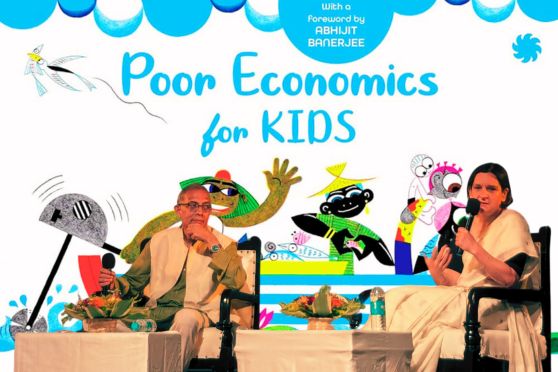

The Indian Council for Cultural Relations (ICCR) hosted an extraordinary book launch on July 8, 2024, for Poor Economics for Kids, authored by Nobel Prize winning economist Prof Dr Esther Duflo and illustrated by Cheyenne Olivier. The event saw fellow Nobel laureate in economics and influential public thinker Prof Dr Abhijit Banerjee join the author duo on stage.
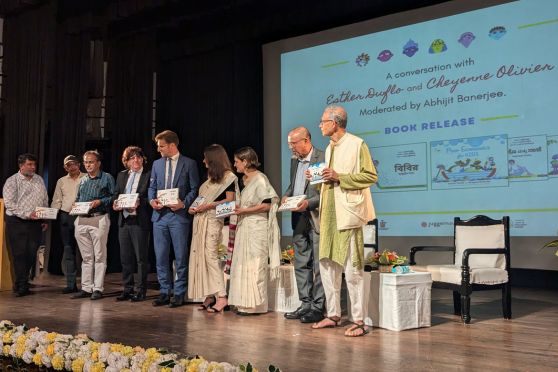
As anticipated, the auditorium was packed with an excited audience of students, educators, dignitaries, and the press, eager to witness the launch of the book and engage with their favourite authors. Following the official book launch, the stage was set for an engaging interaction moderated by Prof Dr Banerjee.
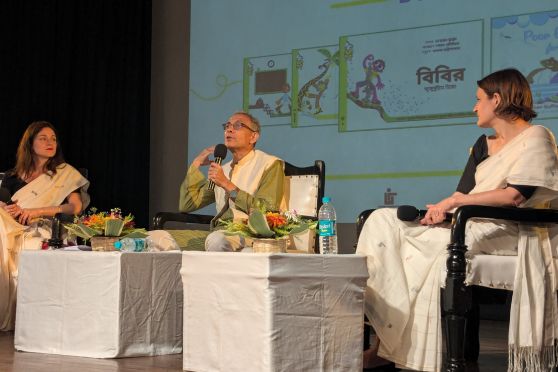
A Unique Endeavour for Young Minds
Prof Dr Esther Duflo and Cheyenne Olivier's collaboration on Poor Economics for Kids aims to address the conventionally ‘adult’ theme of poverty through the eyes of children. It aspires to create a new generation of empathetic and informed individuals by including children in the discourse on poverty.
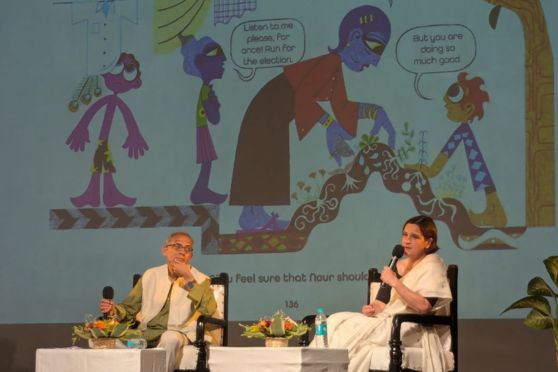
The book consists of ten endearing stories featuring vibrant full page illustrations and touches of humour. The stories of characters like Nilou, Imai, Najy, and Neso will resonate with children globally, highlighting the universal impact of local issues in an interconnected world. Further, it addresses fundamental rights, children's health, economic development opportunities, and gender equality from a child's perspective.
Published in multiple languages, including English, Bengali, Hindi, Kannada, Tamil, and Marathi, the book aims to dismantle stereotypes and foster empathy toward poverty, making it an essential educational resource for parents and educators alike.
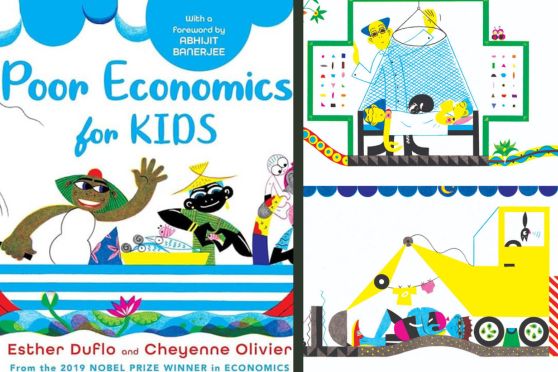
The Allure of A Children’s Book
In the discussion that followed, Prof Dr Banerjee asked Dr Duflo, “Why did you choose to write a book for children?”
The atmosphere was charged with anticipation as Dr Duflo responded thoughtfully, recounting an anecdote from her childhood. "When I was six, I read a comic book on Mother Teresa that depicted Calcutta as an overcrowded city where each person had only 10 square feet to live in. I imagined a vast checkerboard with people huddled into tiny squares. When I finally visited Calcutta as a graduate student, I was struck by the empty spaces and realised the need to move beyond clichés about poverty. Children are young enough to not have prejudices, and it’s crucial to help them understand the complexities of poverty without reducing people to stereotypes."
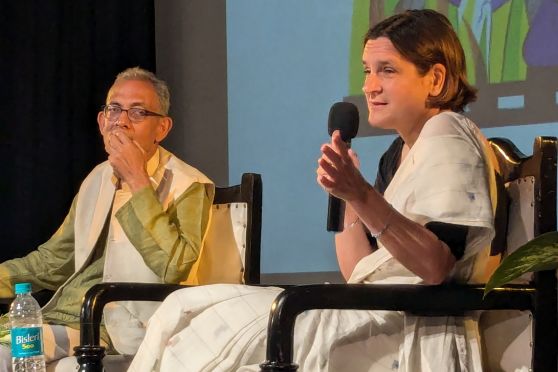
The Power of Stories
Dr Duflo's extensive research as the Abdul Latif Jameel Professor at the Massachusetts Institute of Technology (MIT) and co-founder of the Abdul Latif Jameel Poverty Action Lab (J-PAL) has consistently shown the importance of health, education, financial inclusion, governance, and development economics in improving the well-being of the poor. Transforming this research into engaging stories for children, she and Olivier have created a series that will resonate with young and mature readers alike.
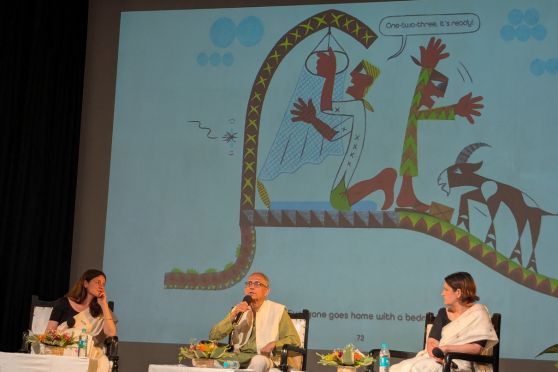
When Prof Dr Banerjee asked, “Why did you decide to create a picture book?”, Dr Duflo explained, "People are more sensitive to and receptive of stories than theories. Our stories are inspired by real life experiences and research accumulated over the years across various geographies. Fiction helps convey difficult topics in an engaging manner. Stories stay with people, especially illustrated ones."
Olivier added, "This book is not just lectures in economics. Many pages focus on the characters' frustrations and include discussions on various subjects."
Insightful Stories for a Better Understanding
As the discussion continued, Prof Dr Banerjee asked Olivier how she went about illustrating the 'rich mental state' of the poor without slipping into stereotypes. Olivier responded, "It was important for us to focus on attitudes and poses. The challenge was walking that thin line between showing the similarities and the distinct differences in the lives of the poor."
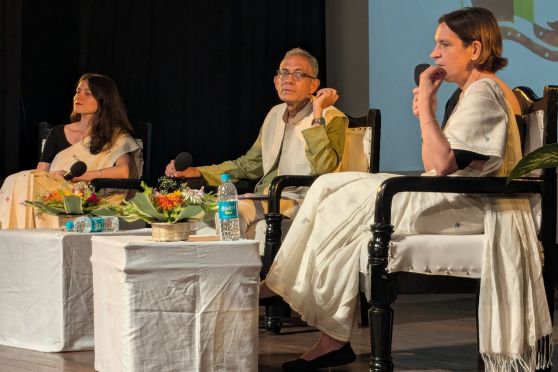
The authors’ interaction was followed by a stimulating question-and-answer (Q&A) session with students and attendees, sparking discussions on the broader themes of poverty, global wealth distribution, and understanding the poor.
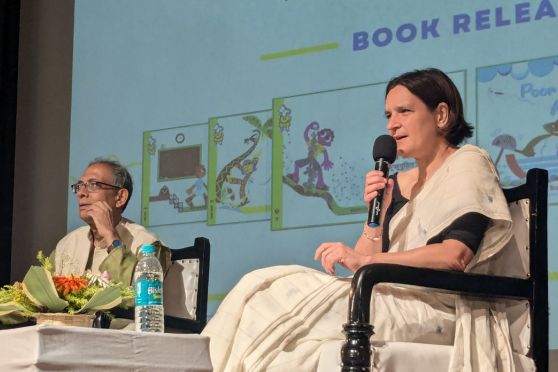
Why Do Children Need to Learn About ‘Poor Economics’?
Understanding poverty and its implications on all of our lives is vital in an increasingly globalised world. Teaching children about poverty will encourage them to question why inequalities exist and what can be done to address them, enabling a compassionate mindset geared toward making the world a better place for all.
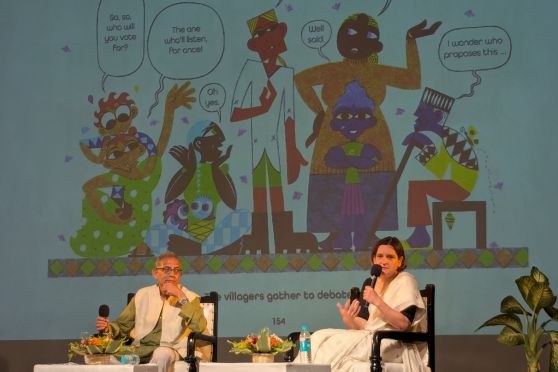
It wouldn’t be incorrect to deduce that Poor Economics for Kids is guided by the objective of the original Poor Economics: Rethinking Poverty & the Ways to End It (2011) which had observed, "Poor Economics is a book about the very rich economics that emerges from understanding the economic lives of the poor… It is not easy to escape from poverty, but a sense of possibility and a little bit of well-targeted help (a piece of information, a little nudge) can sometimes have surprisingly large effects."
The launch of this book marks the beginning of a new chapter in educating young minds about global economic realities with empathy and critical thinking.